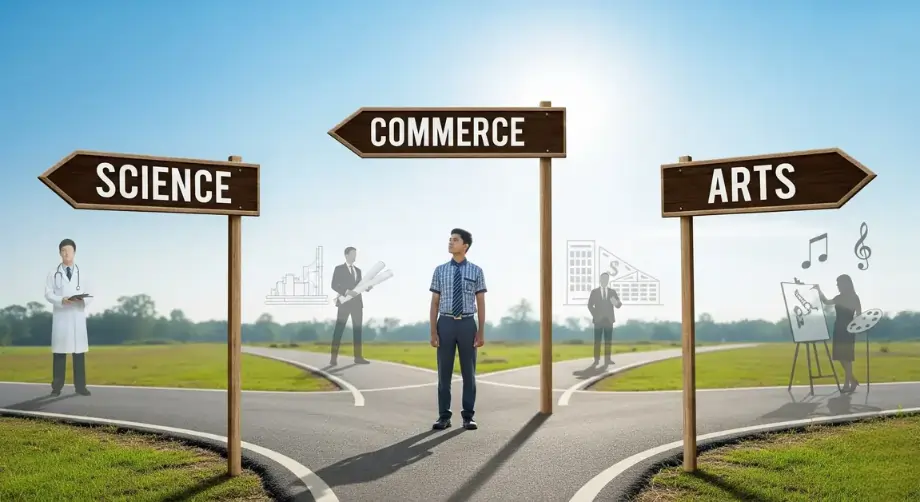Navigate the crucial decision of stream selection with confidence and clarity
Choosing your academic stream after Class 10 shapes your entire career journey. This comprehensive guide breaks down Science, Commerce, and Arts streams, emerging career opportunities, and practical factors to help students and parents make informed decisions that align with personal interests and future goals.

The transition from Class 10 to 11 marks one of the most pivotal moments in every Indian student's academic journey. With CBSE board results in hand, students and parents face the overwhelming task of choosing between Science, Commerce, and Arts streams. This decision doesn't just determine the next two years of study—it sets the foundation for college admissions, career paths, and lifelong opportunities.
Unlike popular belief, there's no single "correct" choice that works for everyone. Each stream opens unique doors and offers distinct advantages. The key lies in understanding your strengths, interests, and the evolving job market to make an informed decision that aligns with your aspirations.
The Indian education system traditionally divides Class 11 and 12 studies into three primary streams, each designed to prepare students for different career trajectories. While these boundaries have become more flexible over time, understanding each stream's core focus remains essential for making the right choice.
The Science stream emphasizes analytical thinking, problem-solving, and research skills through subjects like Physics, Chemistry, Mathematics, and Biology. Commerce focuses on business acumen, financial literacy, and economic understanding through Accountancy, Business Studies, and Economics. The Arts stream develops critical thinking, creativity, and communication skills through Literature, History, Political Science, Psychology, and other humanities subjects.
Each stream has evolved significantly to meet modern industry demands. Today's Science graduates aren't limited to traditional engineering or medical careers, Commerce students explore beyond banking and accounting, and Arts graduates find opportunities in diverse fields from media to international relations.
The Science stream remains the most popular choice among high-achieving students, primarily due to its reputation for opening doors to prestigious careers. Students can choose between two main combinations: PCM (Physics, Chemistry, Mathematics) or PCB (Physics, Chemistry, Biology), with some schools offering PCMB for maximum flexibility.
PCM students typically pursue engineering through JEE Main and Advanced examinations, leading to careers in mechanical, electrical, computer science, civil, or aerospace engineering. The technology boom has created unprecedented opportunities in software development, artificial intelligence, data science, and cybersecurity. Research positions in government institutions like ISRO, DRDO, and private R&D centers offer excellent prospects for innovation-minded students.
PCB students traditionally focus on medical careers through NEET examinations, opening paths to becoming doctors, dentists, veterinarians, or pharmacists. However, the scope extends far beyond clinical practice to include biotechnology, genetics, environmental science, and pharmaceutical research. The growing health and wellness industry offers opportunities in nutrition, physiotherapy, medical technology, and healthcare management.
Modern science careers have expanded dramatically. Environmental engineering addresses climate change challenges, while biomedical engineering combines biology with technology to create medical devices and treatments. Space technology, renewable energy, and artificial intelligence represent rapidly growing sectors with immense potential.
The interdisciplinary nature of modern science means students can combine their interests creatively. Bioinformatics merges biology with computer science, while forensic science applies scientific methods to legal investigations. Science communication has emerged as a crucial field, helping bridge the gap between complex research and public understanding.
The Commerce stream has transformed dramatically in recent decades, moving far beyond traditional accounting and banking roles. Core subjects include Accountancy, Business Studies, Economics, and Mathematics, providing students with a comprehensive understanding of how businesses and economies function.
Chartered Accountancy remains one of the most respected career paths, offering opportunities in auditing, taxation, financial planning, and corporate advisory services. Company Secretary and Cost Management Accountant courses provide specialized expertise in corporate governance and cost optimization. Banking careers through IBPS examinations lead to positions in public and private sector banks, from branch management to investment banking.
Business administration through MBA programs opens doors to management consulting, marketing, human resources, and operations management. The startup ecosystem has created numerous opportunities for entrepreneurship, business development, and venture capital.
Digital transformation has revolutionized commerce careers. E-commerce management, digital marketing, and business analytics have become high-demand fields. Financial technology (fintech) combines commerce knowledge with technology skills, creating roles in payment systems, cryptocurrency, and digital lending.
International trade and global business management offer opportunities to work with multinational corporations or in export-import businesses. Supply chain management has gained prominence, especially after recent global disruptions highlighted its importance. Sustainability consulting helps businesses adopt environmentally responsible practices while maintaining profitability.
Often misunderstood as a "fallback" option, the Arts stream actually offers incredible diversity and flexibility. Students can choose from subjects like English Literature, History, Political Science, Psychology, Geography, Sociology, and regional languages, developing critical thinking, analytical skills, and cultural awareness.
Civil services through UPSC examinations remain the most prestigious career path for Arts graduates, leading to positions as IAS, IPS, and IFS officers. Teaching and academic research in universities offer opportunities to shape future generations while pursuing intellectual interests. Journalism and mass communication provide platforms to inform, educate, and influence public opinion.
Legal careers through law entrance examinations lead to diverse opportunities in corporate law, criminal law, constitutional law, and international law. Social work and NGO management address societal challenges while creating meaningful impact.
The creative economy has exploded with digital platforms and changing consumer preferences. Content creation for social media, streaming platforms, and digital marketing agencies offers numerous opportunities. Graphic design, web design, and user experience design combine creativity with technology skills.
Publishing, both traditional and digital, continues to evolve with new formats and distribution channels. Film and television production, advertising, and public relations offer dynamic work environments. Cultural preservation and museum management help maintain heritage while making it accessible to modern audiences.
The modern job market increasingly values interdisciplinary skills that cross traditional stream boundaries. These hybrid careers often offer the most exciting opportunities and highest growth potential.
Biotechnology combines biology with engineering and business skills. Environmental law merges legal expertise with scientific understanding of ecological issues. Educational technology integrates teaching skills with software development and user psychology. Digital humanities applies technology tools to traditional arts and literature research.
Healthcare management requires understanding of both medical systems and business operations. Sports science combines physiology, psychology, and business management. Food technology merges chemistry, biology, and consumer behavior understanding. These interdisciplinary fields often provide more job security and higher salaries than traditional single-discipline careers.
The most crucial factor in stream selection should be genuine interest and natural aptitude. Students who enjoy solving mathematical problems and understanding how things work often thrive in Science streams. Those fascinated by business news, economic trends, and organizational dynamics typically excel in Commerce. Students who love reading, writing, debating, and understanding human behavior often find Arts most fulfilling.
Aptitude tests and career counseling sessions can provide valuable insights, but honest self-reflection remains most important. Consider which subjects you naturally gravitate toward during free time and which classroom discussions engage you most actively.
While passion matters, academic capability cannot be ignored. Science streams typically require strong performance in Mathematics and Science subjects throughout Classes 9 and 10. Commerce streams benefit from good mathematical skills and logical thinking. Arts streams value strong language skills and analytical thinking.
Competitive examination requirements should also be considered. Engineering entrance exams demand exceptional mathematical and scientific problem-solving abilities. Medical entrance exams require deep understanding of biological processes and chemical interactions. Commerce professional courses need strong numerical and analytical skills.
Research emerging career trends and future job market projections. Technology-related fields continue showing strong growth, but traditional professions are also evolving with technological integration. Consider geographical factors—some careers are concentrated in specific cities or regions, which might influence your future lifestyle choices.
Financial considerations matter too. Some career paths require expensive education or have longer preparation periods before generating income. Others offer quicker entry into the workforce but might have limited long-term growth potential.
Only Science students can pursue prestigious careers and earn high salaries
This persistent myth ignores the reality of modern career landscapes. Top commerce professionals like chartered accountants, investment bankers, and management consultants often earn more than many engineers or doctors. Successful artists, writers, journalists, and civil servants achieve both financial success and social recognition.
The key lies not in the stream chosen but in the dedication, skill development, and strategic career planning within that stream. Every field has its top performers who achieve exceptional success.
Arts stream is easier and suitable only for weaker students
This misconception undermines the complexity and rigor of humanities subjects. Arts subjects require sophisticated analytical thinking, extensive reading, critical evaluation of multiple perspectives, and articulate expression of complex ideas. Many Arts subjects have lower pass rates than Science subjects due to their subjective nature and high standards.
Moreover, Arts education develops crucial soft skills like communication, empathy, cultural awareness, and ethical reasoning that are increasingly valuable in leadership positions across all industries.
Stream choice permanently determines your career path
Modern education and career paths are far more flexible than previous generations experienced. Many successful professionals have changed fields multiple times throughout their careers. Science graduates become successful entrepreneurs, Commerce students pursue creative fields, and Arts graduates excel in technology companies.
What matters more is developing transferable skills, maintaining curiosity, and remaining adaptable to changing opportunities throughout your career journey.
Science students face numerous competitive examinations depending on their chosen specialization. JEE Main and Advanced for engineering admission require systematic preparation starting from Class 11. NEET for medical admission demands thorough understanding of biological processes and chemical reactions. These examinations test not just knowledge but also speed, accuracy, and problem-solving under pressure.
Success in these examinations requires consistent daily practice, regular mock tests, and strategic time management. Many students benefit from coaching institutes, but self-study with quality resources can be equally effective with proper planning and discipline.
Commerce students can begin professional course preparations during Class 11 itself. CA Foundation can be attempted after Class 10, giving students a head start in their professional journey. Similarly, CS and CMA foundation courses provide early exposure to professional studies.
For higher education, entrance exams like IPM for integrated management programs, BBA entrance tests, and economics honors admission tests require focused preparation in quantitative aptitude, logical reasoning, and general awareness.
Arts students should begin UPSC preparation with current affairs reading and basic understanding of Indian polity, history, and geography from Class 11 itself. Law entrance examinations like CLAT require strong English language skills, logical reasoning, and legal aptitude development.
For journalism and mass communication courses, building a portfolio of writing samples, staying updated with current events, and developing multimedia skills can provide significant advantages during admission processes.
Regardless of stream choice, successful students think beyond immediate academic requirements. Building a strong foundation in English communication, basic computer skills, and general awareness benefits students across all streams. Developing hobbies, participating in extracurricular activities, and gaining leadership experience through student organizations create well-rounded profiles that universities and employers value.
Consider international education opportunities early in your planning. Many universities abroad accept students from all streams but may have specific prerequisite requirements. Research these requirements and plan your subject choices accordingly if international education interests you.
The stream you choose after Class 10 is undoubtedly important, but it's not the end of your story—it's just the beginning. Focus on choosing the path that aligns with your interests and strengths, then commit fully to excelling within that chosen direction. Success comes not from picking the "perfect" stream but from making the most of whichever path you choose to pursue.
Remember that careers evolve, industries change, and new opportunities emerge constantly. The critical thinking, problem-solving, and learning skills you develop during Classes 11 and 12 will serve you throughout your life, regardless of which specific stream you choose today.

What Class 10 CBSE Students Should Know About Subject Choices After Boards
Navigating subject choices after Class 10 for a brighter future

How to Prepare for Olympiads and NTSE Alongside CBSE Exams
Mastering the balance between CBSE and competitive exams

The Ultimate Roadmap for Students Who Want to Study Abroad After CBSE
A comprehensive guide for CBSE students aspiring to study abroad.

How CBSE Skill-Based Subjects Are Shaping Future-Ready Students
Exploring the impact of CBSE skill-based subjects on student readiness for the future.